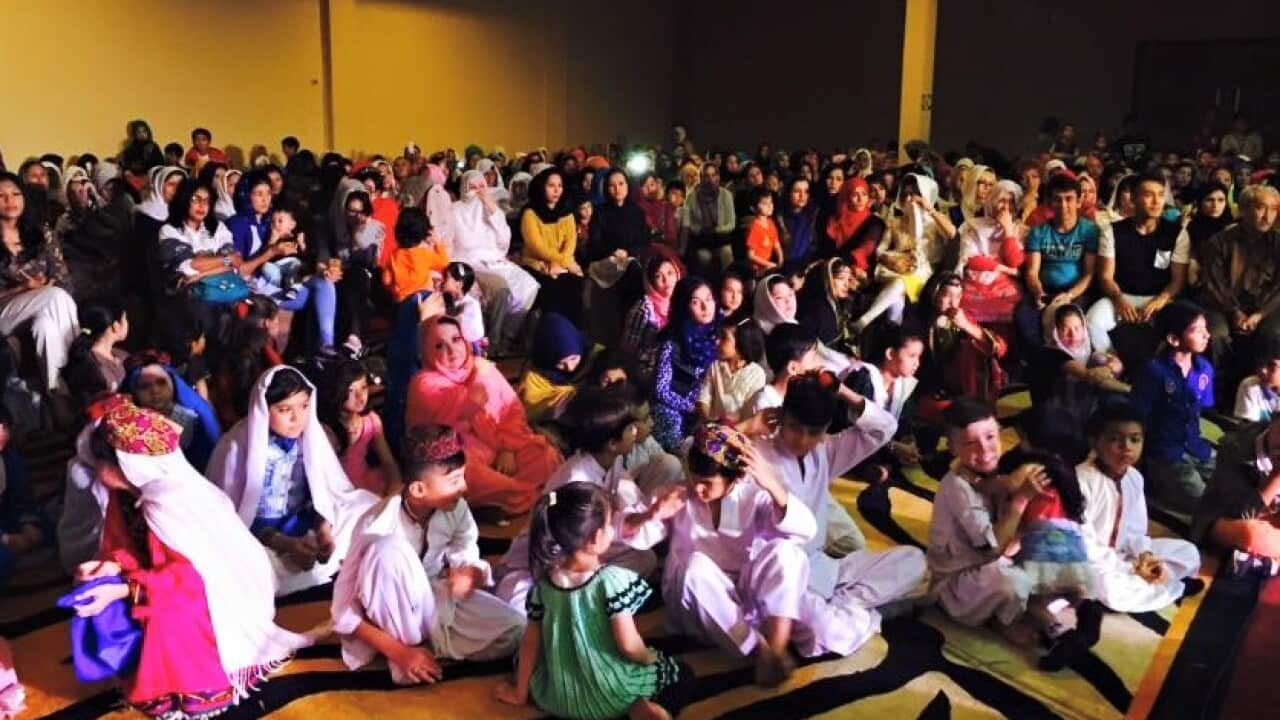Esmatullah Hasani is one of the more than 7000 Hazara refugees who are living with uncertainty in Indonesia.
He told SBS Dari that following a “disappointing” last meeting with officials from the United Nations High Commissioner for Refugees in Indonesia, he decided to take his concerns to the streets of Batam.
Together with his wife and two young children, aged five and nine months, he holds daily protests in front of the Indonesian government offices to draw attention to their “concerning situation”.
The 37-year-old former musician fled Afghanistan in 2015 amid the persecution of the Hazara population, and arrived in Indonesia.
His fears were compounded when the Taliban reportedly kidnapped and killed his former music partner in 2016. “In the last meeting that I had with the UNHCR officials, I shared our problems with them and they said, ‘these are repetitious’. I came to believe that God forbid we should lose one of our family members to have a piece of fresh news for them,” he said.
“In the last meeting that I had with the UNHCR officials, I shared our problems with them and they said, ‘these are repetitious’. I came to believe that God forbid we should lose one of our family members to have a piece of fresh news for them,” he said.

Source: Supplied/Esmatullah Hasani
“The situation is such that no one hears our voice.
“That’s why I was really disappointed and upset and said to myself that there is no other way, the only thing we can do for ourselves is to protest. We started our street protest and it has been two weeks of protesting on the streets.”
Mr Hasani was given refugee status by the UNHCR in 2017 but is yet to be resettled in a third country.
They are among 14,000 refugees and asylum seekers in Indonesia, and he said many of them have fled their countries to seek refuge in Australia. In 2013, the Australian government under the Labor Party announced that no asylum seeker who arrives by boat would be resettled in Australia.
In 2013, the Australian government under the Labor Party announced that no asylum seeker who arrives by boat would be resettled in Australia.

Source: Supplied/Esmatullah Hasani
Then in 2014, the Coalition government went further by banning any refugee and asylum seeker who registered with the UNHCR in Indonesia after July 1 from being ever resettled in the country.
‘Grave concerns'
A group of Hazara diaspora organisations, including several in Australia, have released a statement expressing "grave concerns" over the situation of thousands of Hazara refugees and asylum seekers stranded in Indonesia and Greece.
In the wake of “unprecedented” and “increased security threats against Hazaras in Afghanistan and Pakistan”, the group is urging the UNHCR and resettlement countries to do more to address the refugee crisis.
On May 8, a bombing outside a girls’ school in a Hazara neighbourhood of western Kabul killed at least 90 people and wounded a further 200, most of them teenagers heading home.
Lawyer and board member of the Adelaide-based Baba Mazari Foundation, Besmellah Rezaee, said the more than 7,600 Hazara refugees who are stranded in Indonesia are in a “dire situation”.
“Unfortunately, we’ve seen suicides, we’ve seen very sad and fragile cases of mental illnesses among a large number of refugees who live there,” he said. Mr Rezaee said many are “victims of Australia’s hard border policy” and that the federal government has "shut its doors on them".
Mr Rezaee said many are “victims of Australia’s hard border policy” and that the federal government has "shut its doors on them".

گروهی از پناهندگان در حال عزاداری برای آصف رضایی، پناهنده هزارهای که سال گذشته در اندونیزیا خودکشی کرد. Source: Rahmat Rahyab
He also believes the Hazara refugees have been "deprived of their basic human rights with no hope for the future on the horizon".
Unlike other minorities in Afghanistan, Hazaras are not only subject to numerous forms of discrimination, but also fall victim to “genocidal” attacks, Mr Rezaee said.
“Hazaras in Afghanistan are facing a genocide, unlike other ethnic minorities who are also victims of violence, but victims of war violence."
Mental health issues
Mr Hasani said at least 13 Hazara refugees and asylum seekers have taken their own lives over recent years and self-harming is a daily occurrence among the cohort.
“We have no right to work and we have no right to study. Seven or eight years of isolation at home, in one room. This really makes things very difficult,” he said. “For seven years, we’ve just slept here, been unemployed and this stress about worrying about the future has had a very negative effect on our psyche and we have really lost that patience. We are all suffering from some kind of mental and psychological problem.
“For seven years, we’ve just slept here, been unemployed and this stress about worrying about the future has had a very negative effect on our psyche and we have really lost that patience. We are all suffering from some kind of mental and psychological problem.

A Hazara refugee family in Batam, Indonesia. Source: Supplied/Esmatullah Hasani
“The most painful thing is that they see us as economic refugees. You know that we are not economic refugees, we have escaped war, violence, racial and religious discrimination, and genocide.”
He said if the UNHCR doesn’t listen to his pleas, he and his family will sleep in front of the agency’s office and escalate their protests.
“We just want a peaceful and safe life.
“It doesn’t matter which country, we just want [to settle in] a country where we can have a calm life so that our kids can study.”







